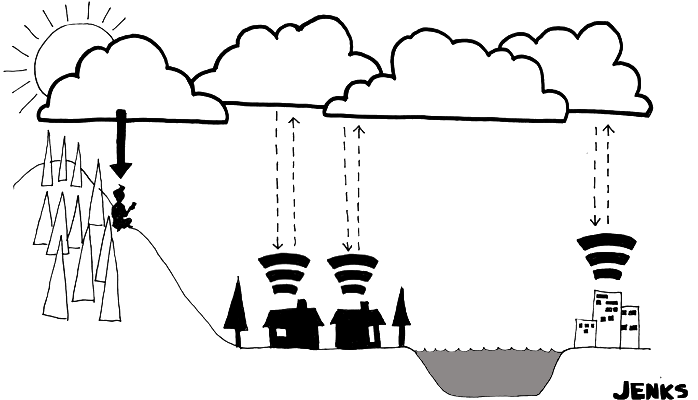There is a major problem with traditional education systems around the world that needs to be addressed.
Let’s face it – there are numerous problems. Young people are becoming increasingly disconnected with what they are learning in schools. Employers are becoming increasingly dissatisfied with the readiness of young employees for the workplace. Teachers are becoming more disenfranchised, as the ever-increasing burden of improving standards and exam performance hampers their ability to teach freely.
And yet, beyond all this lies an even deeper problem. Generations of adults are suffering a crisis of purpose. Deep down, they do not love what they do. They experience stress, anxiety, depression, sadness, unfulfillment, anger, disappointment, regret, exhaustion, boredom – all negative emotions causing physical effects and social problems. So many people have taken the path set out for them, rather than the path of their true calling – and that is hurting them on the inside.
For me, the principal output of education should be human thriving. And for humanity to thrive, we need to enable each child to develop the skills to take their own paths in life to achieve thriving and fulfilment. Sure, financial resources are important – but only up to a point.
For me, an educational curriculum needs to help the learner to explore the following questions and discover the answers, over time:
- What do you love?
- What you are good at?
- What does the world need – to which you can contribute?
- How can you receive the resources you need to thrive?
For me, the sweet spot in life is the point at which the answers to all these four questions interconnect and converge. This is what I call Ikigai.
 Ways of achieving this in the future will be completely different from what we know to be possible now. The world is progressing fast, and unimaginable things are being created and achieved.
Ways of achieving this in the future will be completely different from what we know to be possible now. The world is progressing fast, and unimaginable things are being created and achieved.
Think about the gaming industry – and how it uses immediate, fast feedback to keep attention much more focussed.
Think about all the content available online, providing information and training on any number of skills and subjects.
Think about school in the cloud, where kids are learning unbelievable things on their own, without any teaching support.
Think about the transformational effects of coaching on people’s lives (it certainly revolutionised my own life, and others’ I know).
Think about open source projects like wikipedia – achieving so much more than traditional organisations have managed to achieve on their own.
Think about Pokemon Go and technology getting people out into the world, collaborating in new and interesting ways.
Think – all kinds of things way beyond the realms of possibility now will soon be created, enabling the human race to reach new heights.
How do we help every child – and every adult – to feel that they are thriving and enjoying life, and fulfilling their own sense of purpose in society?
How can the education systems of the world provide an infrastructure, curriculum and processes that facilitate this?
Unhooking from the current educational paradigm may seems like mission impossible at the moment – but it will happen in years to come. I, for one, am committed to being part of the solution in some way.
I would love to hear your thoughts and ideas on this. Please write in the comments section below or getintouch@marcwinn.com
To reimagining curriculum.
Marc
P. S. Listen to Marc Lewis from the School of Communication Arts talk about transforming education and the future of curriculum. Click here to listen
Buy Me a Coffee
Did you love this article? If so please consider buying me a coffee.
Take The 50 Coffee Adventure
A Fun, Light and Easy Way to Build Connections
Or search your local Amazon store for "The 50 Coffee Adventure".

I agree with everything you just mentioned. In particular the questions to be asked so that the younger ones can have a reliable guide toward their personal goals.
Where I’m from, the education system is not only years, but eons away from thinking like this. I admire your positivity in committing to be part of the solution.
I love your insight, as usual, Marc! I think that one of these questions cannot stand alone. We must be asking ALL of the questions. Otherwise, we’ll create online learning that doesn’t unlock any opportunities or offer direction for next steps. Sometimes giving our youth access doesn’t necessarily mean they’ll engage. So, to your point, starting with your four questions, giving them their ikigai (love that word, btw) is truly the way I would encourage us all to think. What their ikigai will do is provide the gentle direction of where they will find the most success, and where they will begin to thrive, become more curious, and gain the courage to try, fail, and keep on going knowing that it’s all part of the learning process. Good stuff!
I’d like to add something, if I may? Maybe some sort of “self-improvement” section could be added as this is something I am driven by. Though it probably could come under one of the other areas and I’m not sure I like the word “improvement” as what does that actually mean? I mean more like learning a varied set of skills covering a wide range of subjects, not because anyone told me to but because I want to know stuff about stuff. I suppose it stems from curiosity and a want to try new things and achieve. Not sure if this is a natural instinct that we as humans have or just me?
All very sound and sensible Marc, although one area that, I believe, needs much greater explicit attention involves the role and importance of Wisdom.